2021 STATE OF SUSTAINABILITY IN AMERICA, 19th Annual Consumer Insights & Trends Report
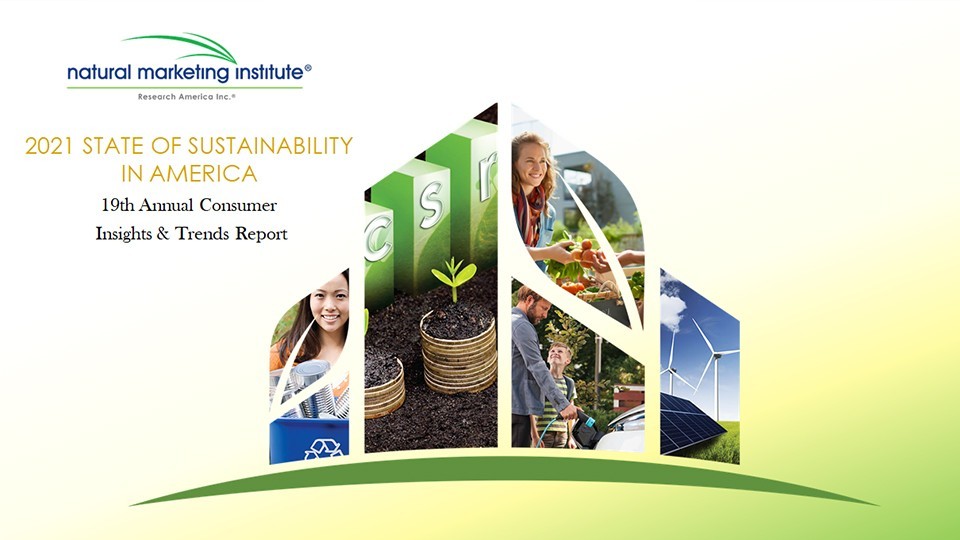
125 pages of the Institute’s research, study supported, providing current consumer insights with data and analysis, including charts, graphs, and illustrations!
Site License: Includes PDF, PPT with access to charts and site rights for internal network usage across one company BRAND/location.
Price: $15,000 Order Report
Introduction: 19 Years of Sustainability Marketplace Insights
This report is the nineteenth annual U.S. report Natural Marketing Institute® has published on the state of the sustainability market. The report measures and describes the marketplace for sustainable products and services, the consumers who use them, consumers’ expectations of corporate behavior, and attitudes toward environmental responsibility and social issues. In addition, it uncovers consumer motivations and the challenges they encounter in their pursuit to become increasingly aligned with a more sustainable lifestyle.
In fact, our findings reveal consumers are clearly showing more sophistication within the realm of sustainability – with a greater understanding of its breadth, depth, and implications, and they pick the elements that mean the most to them. In this year’s research, we are finding a heightened awareness and concern with environmental responsibility for the health of the planet which appears to be causing shifts in consumer behaviors. Instead of adopting environmentally-friendly behaviors for more self-directed and personal benefits, consumers are looking outward to the environment around them and realizing they have to take a bigger part in fixing the ills that are disrupting planetary health.
Even further, the year 2020 introduced a variable into the health landscape which no one could predict. When viewing trends within this report, it is important to note that the current 2020 study was fielded in October of 2020. Therefore, the data collected in 2020, compared to previous years, may reflect changes due to the impact of the COVID-19/Coronavirus pandemic. Many of these changes may be temporary, while some may be permanent shifts in consumers’ attitudes and behaviors. However, there appears to be evidence that the COVID-19 pandemic may have ignited a stronger conviction towards environmental protection and sustainable behaviors among the population.
In this report, we uncover the insights into what may lie ahead and provide perspective on the trends within the sustainability market from a consumer point of view.
- How segments within society view sustainability differently and what motivates this differentiation
- Consumer insights regarding the health of the planet and what issues resonate most
- The impact of the COVDI-19 pandemic on sustainable attitudes and behaviors
- Behaviors consumers are adopting to live more sustainably
- The feasibility of a “circular economy”
- Consumer attitudes toward plastic and packaging
- How the iGen generation views the environment and sustainability
- …and much more
Table of Contents
U.S. Sustainability Consumer Trends Database Overview
Definitions of Groups
Introduction
Status of Sustainability in Today's World
Trends in Sustainability
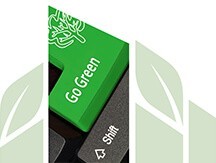
The Institute's Sustainability Segmentation
Sustainability Segmentation Overview
Sustainability Segmentation Model Methodology
Five Distinct Sustainability Segments
The LOHAS Consumer Profile
The NATURALITES Consumer Profile
The DRIFTERS Consumer Profile
The CONVENTIONALS Consumer Profile
The UNCONCERNEDS Consumer Profile
LOHAS Consumer as Environmental Steward
Sustainability Process Explained
Sustainable Mainstream Overview
Leader and Followers Profile
Early Adoption Profiles
Demographic Summary Across Segments
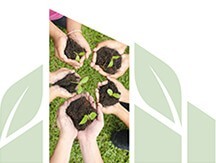
Consumer Sustainable Mindset
Environmental and Social Concerns
Personal Responsibility for the Environment
Interconnection of Personal & Planetary Health
Trended Concern Over Pesticides & Chemicals
Willingness to Sacrifice for Environment
Interest in Regenerative Organic Agriculture
Participation in Sustainable Behaviors
Minimizing Personal Impact on Global Warming Trended
Generational Perceptions of Personal Impact on Global Warming
Self Perceptions of Being "Green" and "E-informed"
Perceptions of Green Living Across Age Groups
Consternation Regarding Environmental Involvement

Perceptions of the State of the Planet
Consumers' Environmental Concerns
Perceptions of Environment Compared to 1970's
Concern about Air Pollution
Concern about Toxins in Soil
Concern about Water Issues
Concern about Global Warming
Concern about Issues Related to Biodiversity
Concern about the Decrease in Biodiversity
Concern Over Earth's Ability to Sustain Life
Concern Over Earth's Future Since COVID-19 Outbreak

The Impact of COVID-19 on Sustainable Engagement
Shopping Behaviors During the Pandemic
Meal Preparation During the Pandemic
The Effect of COVID-19 on E-Friendly and Sustainable Attitudes
The Effect of COVID-19 on Commitment to Sustainable Companies
The Pandemic's Effect on Waste Production & Recycling
Interest in Natural Products Due to COVID-19
Self Preservation Behaviors
E-Friendly Behaviors During the Pandemic
Perceptions of Companies' Sustainable Commitment
Environmental "Positives" Due to Lockdown
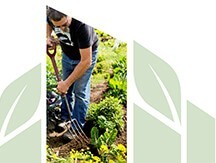
Waste, Recycling and the Plastic Problem
Concern About Plastic Pollution
Preference for Non-Plastic Alternative Packaging
Preference for Stores/Restaurants to Use Less Plastic
Recycling Frequency of Specific Materials
Skepticism Regarding Curbside Recycling
Ratings of Environmental Friendliness of Specific Materials
Consumer Acceptance of Refillable and Reusable Economy
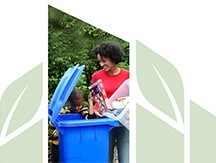
Corporate Involvement: A Social and Environmental Perspective
Concern for Social Issues
Preference for Companies That Support Social Issues
Alignment with Brand Values
Interest in Companies' Social Initiatives
Concern about Companies Environmental Initiative since COVID-19
Interest in Companies' Environmental Initiatives
Social & Environmental Concerns Among LOHAS Consumers
Preference for Companies' Support of Local Initiatives
Perceived Leaders of Environmental Protection
Desire for Institutions to Do More
Trust in Institutions to Protect Environment
Trust in Institutions to Protect Environment by Generation
Impact of a Company's Sustainability Initiatives on Trial and Purchase
Skepticism of Companies' Environmental Initiatives
Consumer Actions to Determine Companies' Environmental Initiatives
Boycotting Behavior Due to Lack of Companies' Sustainable Initiatives

The Relevance of Sustainability Toward Product Purchase
Consumer Preference for Sustainable Purchases
Consumer Acceptance of a Circular Economy
Reducing Environmental Impact Across Product Life Cycle
Desire to Purchase "Green" Products Trended
Concern Over Chemical Content in Consumer Products
Chemical Monitoring Across Product Categories
Growth in Interest of Natura and E-Friendly Versions of Product Categories
Interest in "Natural" vs. "E-Friendly" Versions
Perceived Sacrifices of Environmental Product Use
Importance of Household Cleaning Product Attributes
Growth in Importance of Household Cleaning Product Attributes
Importance Ratings of Personal Care Product Attributes
Growth in Importance Ratings of Personal Care Product Attributes
Use of Natural or Organic Personal Care Products
Use of Plant-Based Products
Reasons for Reduction in Meat Consumption
Meat Reduction Due to Environmental and Animal Welfare Concerns
Growth in Importance of Food/Beverage Attributes
Relevance of Certifications on Product Purchase
Recognition and Understanding of Certifications & Seals
Impact of Certifications on Product Purchase Intent
Sources of Influence on Sustainable Purchase
Barriers to Environmentally-Friendly Purchase
Impact of Price on Social and Environmental Orientation

Sustainability in Retail
Perceptions of Sustainable Shopping Methods: Online vs. Stores
Impact of COVID-19 on Brick & Mortar Shopping
Concern About Packaging and Online Ordering
Consumer Desire for Sustainable Shopping Experience
Interest in "Refillable" Shopping
Trended Channel Shopping
Internet Site Shopping

The Institute's Sustainability Segmentation
Consumer segments in the general population exhibit various shades of ‘green’ based on their levels of environmental and sustainable engagement. While some consumers have ‘deep green’ consciousness, there are varying levels among consumers within the American population.
- The consumer segment within the population which is considered the ‘greenest’ segment is the LOHAS (Lifestyles Of Health And Sustainability) consumer who is integral in helping to drive sustainability into the mainstream.
- Other segments within the population also hold ‘green’ attitudes and participate in ‘green’ behaviors but their motivations are differentiated.
- By understanding the consumer segment’s orientation, organizations are better equipped to determine how to target the most optimal segment with the most relevant marketing strategies.
Sustainability Segmentation Model Methodology

Development of the Institute’s unique and proprietary segmentation model began with evaluating over 170 different attitudinal and behavioral variables, later narrowed to approximately 15. A k-means clustering method was used. Cluster centers were defined as dense regions in the multivariate space based on a k-means segmentation of the attitudinal variables from the Institute’s Sustainability Consumer Trends Database survey.
This segmentation can be used to identify and predict segment membership as part of a quantitative extrapolative analysis of future consumer behavior.
5 Unique Segments: each segment is mutually exclusive and is designed to have the maximum differentiation between consumer groups and the maximum homogeneity within each consumer group. The predictive accuracy is high at 86%.
The segmentation has been overlaid on third-party data sets such as Nielsen’s Homescan and can be used through the Institute in custom/primary qualitative or quantitative research.
U.S. Sustainability Consumer Trends Database® (SCTD) Overview
Scope:
- Quantifies the size of the consumer market for environmentally and socially responsible products and services
- Measures the importance of environmental and societal issues as well as corporate social responsibility
- Explores environmentally conscious behavior
- Determines consumer usage of sustainable products and services and quantifies purchase criteria
- Annual tracking study in U.S. since 2002 and globally since 2005
Report Methodology:
- 3,000 U.S. adults in 2020, nationally projectable to the U.S. adult population and accurate at the 95% confidence level to +/- 1.2%
- Conducted online
- Fielded October 2020
- Report released January 2021
Natural Marketing Institute Databases:
- U.S. Trending since 2002 and Globally since 2005
- Conducted in 23 countries; 150,000+ global consumers interviewed
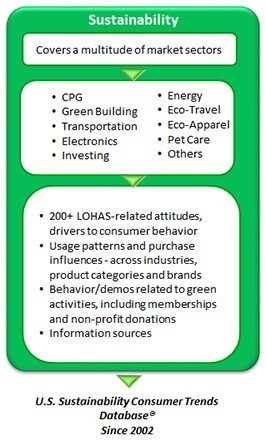
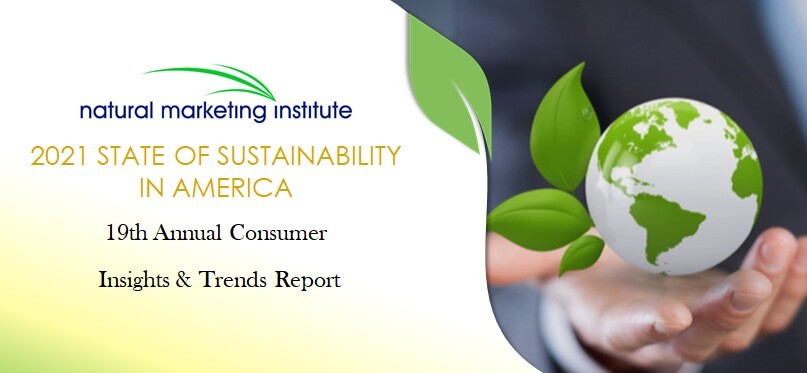
For more information on our 2021 Sustainability Consumer Trends Report, kindly contact Steve French, Chief Operating Officer.
